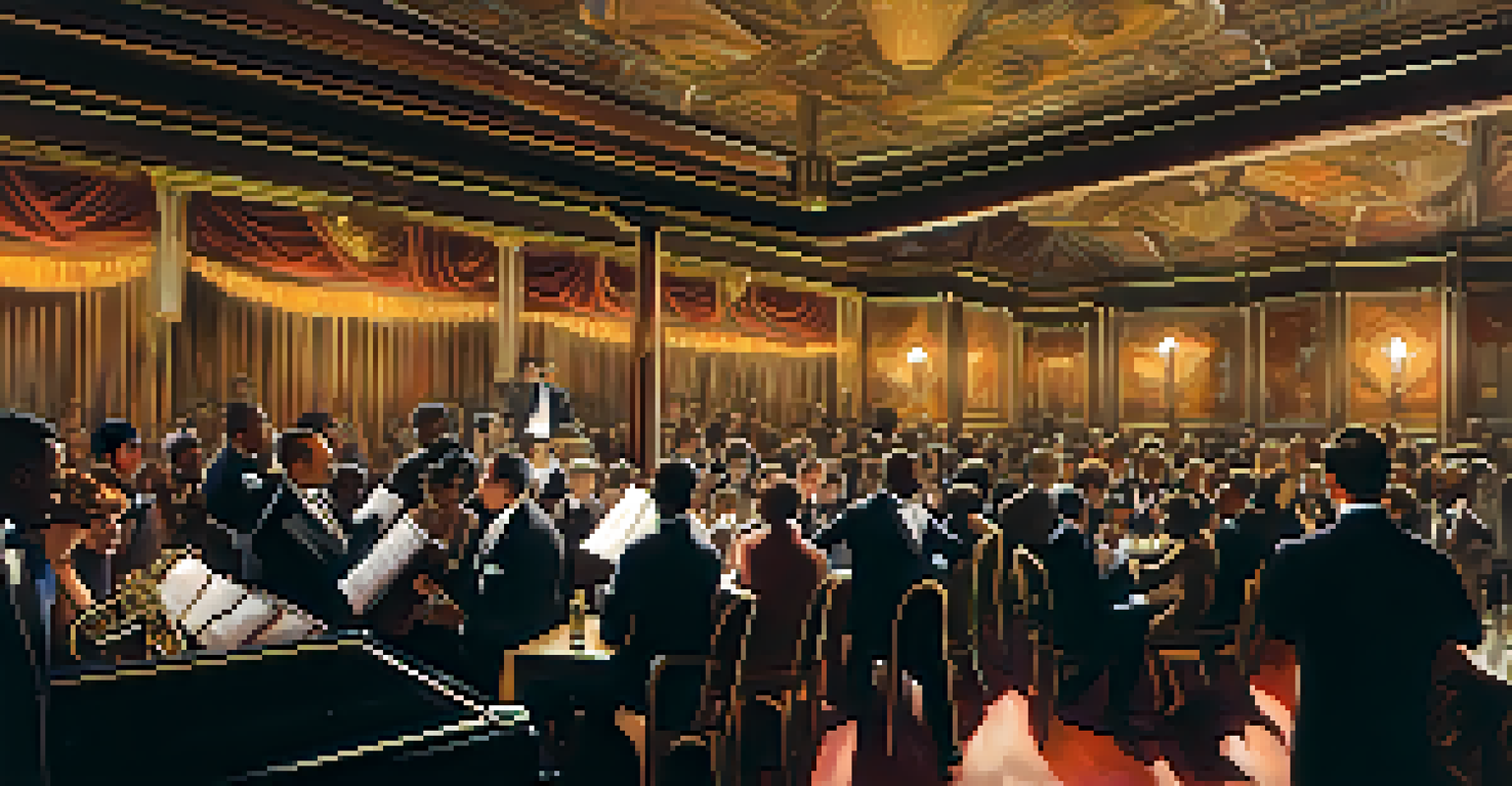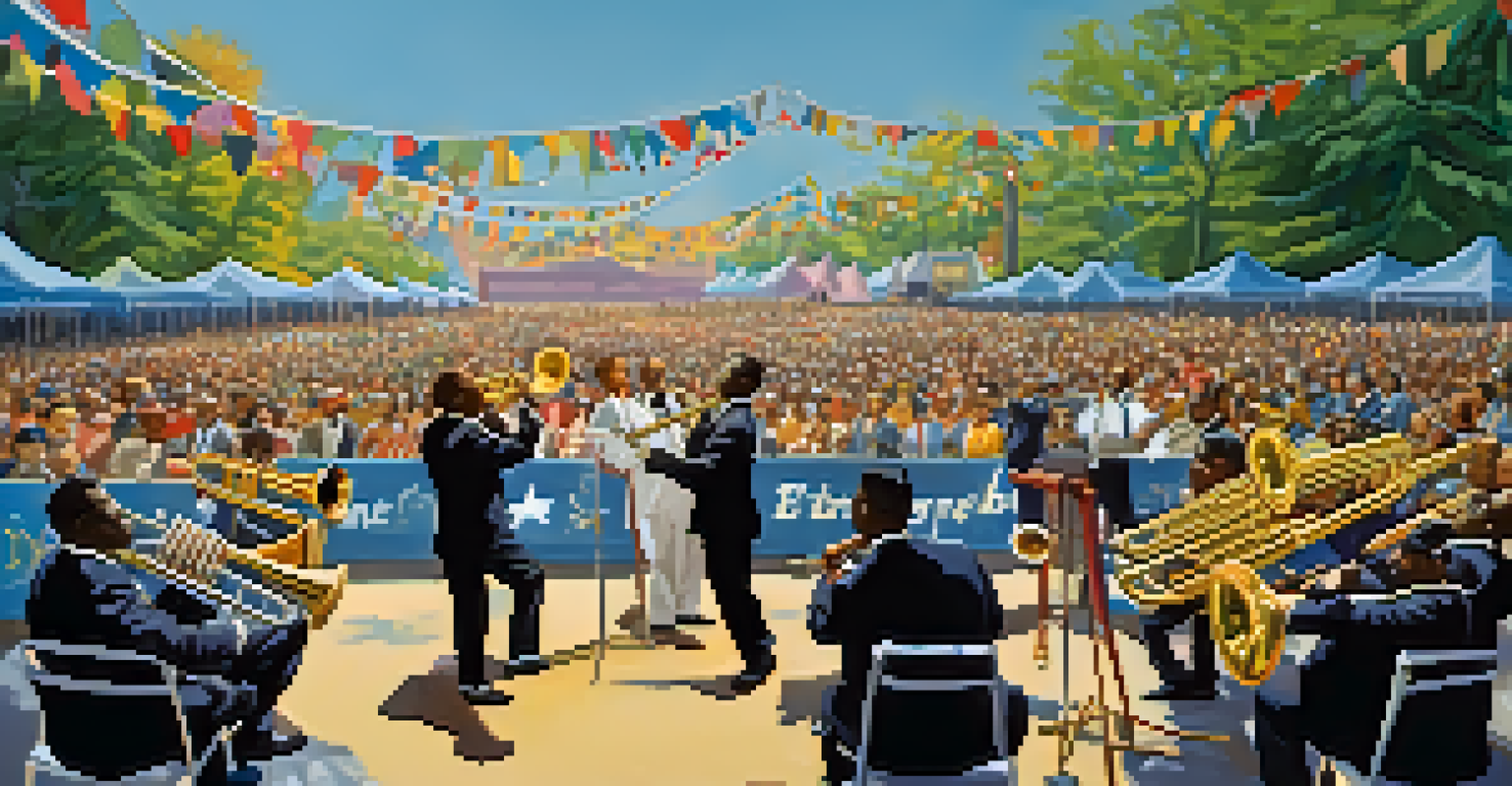Louis Armstrong: The Jazz Legend from New Orleans to NYC

Louis Armstrong's Humble Beginnings in New Orleans
Born on August 4, 1901, in New Orleans, Louis Armstrong grew up in a challenging environment. Raised in a poor neighborhood, he faced numerous hardships, but his passion for music blossomed early. The vibrant sounds of jazz that filled the streets of New Orleans became the soundtrack of his youth, influencing his unique style.
If you don't like my music, don't listen to it.
Armstrong's first musical experiences came from learning to play the cornet while at a home for troubled boys. This introduction to music not only kept him out of trouble but also ignited a lifelong love affair with jazz. His dedication and talent quickly became evident, leading him to perform with local bands and eventually shaping his future.
New Orleans was a melting pot of musical influences, and Armstrong was at the heart of it all. He absorbed various styles, from ragtime to blues, which would later define his contributions to jazz. His early years in this culturally rich city laid the groundwork for his legendary career.
The Rise of a Jazz Star: Early Career Highlights
In the early 1920s, Armstrong's career began to take off as he joined King Oliver's Creole Jazz Band in Chicago. This was a pivotal moment that introduced him to a wider audience and allowed him to showcase his extraordinary trumpet skills. His innovative playing style and charismatic stage presence captivated listeners and fellow musicians alike.

During this time, he made some of his first recordings, including the famous 'West End Blues,' which showcased his incredible range and improvisational abilities. These early recordings solidified his reputation as a leading figure in jazz. Armstrong's unique ability to blend technical proficiency with heartfelt emotion set him apart from his peers.
Armstrong's Roots Shaped His Sound
Louis Armstrong's early life in New Orleans, infused with diverse musical influences, laid the foundation for his groundbreaking contributions to jazz.
As he continued to gain popularity, Armstrong began to perform with other notable artists, further expanding his influence in the jazz scene. His move from New Orleans to Chicago marked the beginning of an extraordinary journey that would eventually take him to the jazz capital of the world: New York City.
Louis Armstrong's Move to New York City
In 1924, Armstrong made the bold decision to relocate to New York City, where the jazz scene was flourishing. This move was crucial for his career, as NYC was home to some of the country’s most prestigious jazz clubs and musicians. It was here that he truly began to establish himself as a jazz icon.
What we play is life.
Performing at venues like the Cotton Club, Armstrong gained a reputation for his electrifying performances. His charm and humor on stage made him a favorite among audiences, contributing to his growing fame. Armstrong's presence in New York also allowed him to collaborate with other jazz legends, enhancing his musical repertoire.
Living in New York City also exposed Armstrong to new musical styles, further enriching his artistry. He embraced the opportunities the city offered, continually evolving as a musician while remaining true to his New Orleans roots. This adaptability helped him to carve out a unique space in the ever-changing landscape of jazz.
The Birth of the Louis Armstrong All-Stars
In the late 1940s, Armstrong formed the Louis Armstrong All-Stars, a band that would become synonymous with his name. This ensemble allowed him to showcase not only his trumpet skills but also his exceptional vocal talents. The band featured a rotating cast of talented musicians, each bringing their unique flair to the group's sound.
With the All-Stars, Armstrong recorded numerous hits, including 'Ain't Misbehavin'' and 'When the Saints Go Marching In.' These songs became staples in the jazz repertoire and showcased his ability to connect with audiences on a personal level. His infectious energy and passion for music shone through in every performance.
A Jazz Icon in New York City
His move to New York City in 1924 marked a pivotal moment in his career, allowing him to perform at prestigious venues and collaborate with legendary musicians.
The All-Stars also played a significant role in popularizing jazz across various demographics. Armstrong's appeal transcended racial barriers, making him a beloved figure in American music. His dedication to the All-Stars helped solidify his status as one of the greatest jazz musicians of all time.
Armstrong's Impact on Jazz and American Culture
Louis Armstrong's influence on jazz is immeasurable; he helped shape the genre into what it is today. His innovative approach to improvisation and ability to blend different musical styles inspired countless musicians. Armstrong's pioneering spirit paved the way for future generations of jazz artists, making him a crucial figure in the evolution of the genre.
Beyond music, Armstrong became a cultural ambassador for jazz, breaking down racial barriers during a time of segregation. His success challenged societal norms and opened doors for African American artists in the music industry. Through his performances and recordings, Armstrong promoted a message of unity and joy.
Armstrong's charm and larger-than-life personality made him a beloved figure not just in jazz, but in American culture as a whole. His legacy continues to resonate today, reminding us of the power of music to bring people together and inspire change. From New Orleans to NYC, Armstrong's journey left an indelible mark on the world of jazz.
The Later Years: Triumphs and Challenges
As Armstrong entered the later years of his career, he faced both triumphs and challenges. Despite health issues, he continued to perform and record, showcasing his resilience and dedication to music. His ability to connect with audiences never waned, and he remained a beloved performer until the end.
In the 1960s, Armstrong found himself navigating the changing landscape of jazz and popular music. While some artists embraced new styles, Armstrong stayed true to his roots, infusing traditional jazz with contemporary elements. His unique blend appealed to both old fans and new listeners alike.
Legacy of Unity and Joy
Armstrong's impact transcended music; he became a cultural ambassador who broke down racial barriers and inspired generations with his message of unity.
Despite the challenges, Armstrong's spirit remained unbroken. He received numerous accolades, including a Grammy Lifetime Achievement Award, solidifying his legacy as a jazz legend. His later years were a testament to his passion for music and his unwavering commitment to sharing joy through his art.
A Lasting Legacy: Remembering Louis Armstrong
Louis Armstrong passed away on July 6, 1971, but his legacy lives on in the hearts of music lovers worldwide. His groundbreaking contributions to jazz continue to inspire musicians across genres. Armstrong's innovative spirit and charismatic presence have made him a timeless figure in the music industry.
Today, jazz festivals and educational programs celebrate his life and work, ensuring that future generations will know his story. His recordings remain popular, and his influence can be heard in the music of artists spanning multiple genres. Armstrong’s ability to transcend musical boundaries is a testament to his talent and vision.

As we remember Louis Armstrong, we celebrate not just a musician, but a cultural icon who changed the landscape of music forever. His journey from the streets of New Orleans to the stages of New York City is a powerful reminder of the transformative power of art. Armstrong’s spirit continues to inspire us to embrace our passions and share them with the world.